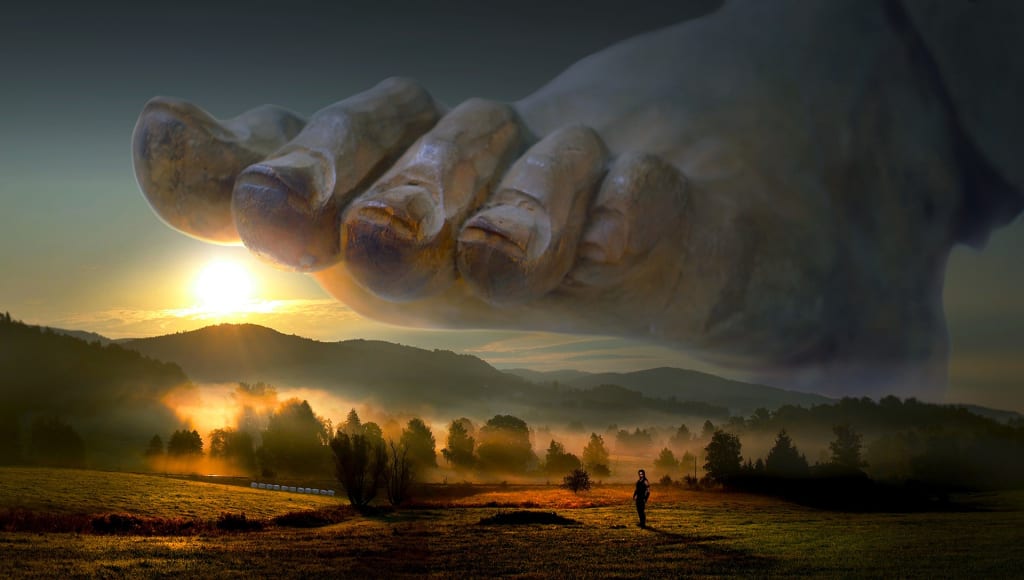Are We Gods in Our Own Right?
Has humanity reached a level of intelligence that constitutes a deity?

Are we gods in our own right?
A friend of mind and I have had a discussion on this weird question. If you’re thinking “BLASPHAMY!!” then rest assured, both my friend and I believe in God. This was simply a philosophical exploration on how far we’ve come as human beings.
This question was first brought up by the friend I mentioned earlier while we were recording our amateur podcast (Pointlessly Interesting Talks). He struggled to voice the question at first and tried hard to phrase it in a way that wouldn’t be too offensive but eventually, he just went ahead and said “Are we gods in our own right?” At first, I was confused; what kind of question is this?! But then he went on and explained himself.
He said that humanity has come very far in the short time that we lived in our Earth. Human innovation reached a level where we can even alter DNA!
An everyday example of this is corn. Corn is a manmade grain; it started out as a grass called Teosinte and, through artificial selection (don’t ask me how it’s done), eventually what we know as corn was developed. It is not just corn that had been through this, however, many (if not all) modern fruit and vegetables are artificially altered in one way or another.
An extreme example of DNA alteration is what’s known as 'designer babies' (yes, your read that right!). Designer babies are a concept that has been around at least since the early 2000s (when the first designer baby was born) but most people wouldn’t have heard of the “designer baby” concept. My friend and I only came across the term “designer baby” in around 2017, when we were looking for interesting things to talk about and just happened upon it.
Designer babies are made through In Vitro Fertilisation (IVF). Most are familiar with this process, where the fertilisation process happens out-with the mother’s/surrogate’s body and then inserted for impregnation. The difference here is that the doctor (or technician, whatever they're called) can select particular genes that would create the best result for the criteria set beforehand by the parents. The parents could ask for a girl specifically, or a baby with blue eyes for example. This process doesn't guarantee the outcome, but it can increase the odds.
Another application of this 'designer baby' concept is 'saviour siblings'. This is where the embryo is selected in the likely chance that the baby produced can be a match for transplant of organs etc. to a critically ill child the parents may already have. You can imagine that there are many ethical implications of the 'saviour sibling' concept, and maybe you would like to explore it further, unfortunately, it is not the topic of conversation in this article.
Another point my friend brought up was that we humans had no right to reach the heights we did here on earth; against all odds, be it naturals disasters, natural predators, or even ourselves, we continued surviving. Simply surviving wasn’t enough for us, however, we wanted to excel and rule the earth, so what did we do? We used the thing that differentiates us from other animals; our intelligence.
In a documentary series called Cosmos: A Spacetime Odyssey, presented by the renowned astrophysicist Neil deGrasse Tyson, Dr. Tyson mentions how humanity domesticated animals in order to survive. The wolf, for example, was domesticated and eventually some were tuned to what we now call Dogs. In this respect, humanity has finally stopped being—as my friend says—the "chameleon of the animal world" (aside from the actual chameleon), to being the animal that others adapt around in order to survive.
Wolves recognised that, because of weapons and other tools we had, it was getting harder to hunt humans for food. One of the methods humans used to fend off attacks was to give wolves an alternative source of food (other than themselves). Wolves then started to recognise that in order to get food from humans, they must get close to them, and from then on, the relationship developed to the point where Dog are now human’s “best friend.”
My friend has a point here; we humans have come to a point where we’re technically at the top of the food chain (above lions, tigers, sharks and so forth of the world’s deadliest animals) when we had no right to be. I can’t argue against humanity’s ability to adapt and overcome obstacles, we are amazing in that regard, but… do we really possess the ability to call ourselves gods?
Humanity lives in the already available universe. The universe was there long before us. In fact, in Cosmos: A Spacetime Odyssey, Dr. Tyson presented the “Cosmic calendar”, which is a visualisation of the universe’s 13.8-billion-year life span in the scale of a single calendar year. This idea was first created by Carl Sagan (another renowned Astrophysicist).
In this cosmic calendar, we humans only appeared in the last second of the last day of the calendar. This tells you that we are mere specs in the history of the universe as a whole.
Humans have indeed achieved many things in this “spec-of-dust” length of time we were alive, but does that really amount to anything when it comes to the creation of the universe? Even if you do not believe in God, and think all of this happened by chance, there are at least 100 billion stars that exist in our own Milky Way Galaxy, let alone the ever-expanding universe.
Our existence is bound by the laws of the place we live in. We cannot—and will not—create something out of nothing; everything is bound by scientific laws that we are still discovering.
If a natural disaster were to take place, what can we do against it? There are certain precautions we can take of course, but these precautions are limited; it is more likely than not that fatalities will occur in the area where the natural disaster hits, in spite of whatever preparations made. We have no power over nature.
Now to the first point my friend mentioned; the altering of DNA. Altering anything is, by definition, changing something that already exists. We could not create things out of nothing.
For designer babies, we simply intervened in the natural fertilisation process and made modifications (although as I understand it, this process is illegal in most countries as of 2023). Also, as far as I understand, genetically modified food is created by infusing different genes together to produce the desired item; more or less the same general process done through IVF in designer babies, i.e., modifying something that already exists.
My friend called human beings chameleons, as I mentioned earlier, because we adapt to the world around us, like chameleons change colour to camouflage (I learned recently that this is actually a misconception and that they change colour based on their mood). According to him, we ceased to be chameleons because we created tools to beat animals and eventually domesticated them.
Now that is impressive of us humans. We intelligently adapted to survive, and when we learned how to overcome these obstacles, we reached the top in the food chain. You could say that overcoming such crazy barriers required God-like ability but, if you view this from the other side, aren’t the animals we domesticated doing the same as we did before? … adapting to survive? Did we really domesticate them, or is it simply them recognising the need to adapt to us? Who’s benefiting more here?
The points mentioned in this article are loosely collated from the talk my friend and I had about this subject, so some of it may seem incoherent to you as a reader, but I do hope that you get the gist of what I’m trying to convey, and maybe become curious enough to think about the question of this article and form an opinion of your own.
My friend believes that humanity is at least on the brink of reaching “god-level” ability in terms of technological advancement, medicine, and our understanding of space, if they haven’t reached there yet.
I, on the other hand, believe that, in spite of the advancements we had achieved, we will not be able to release the bonds of the laws of physics that shackle our existence in this universe.
What do you think?
About the Creator
Mohammed Darasi
I write fiction, poetry and occasional articles about interesting topics. I recently created a website (just because) which I will be posting my writing in (among other things). it would be great if you check it out. https://mindpit.co.uk/
Reader insights
Outstanding
Excellent work. Looking forward to reading more!
Top insights
On-point and relevant
Writing reflected the title & theme
Easy to read and follow
Well-structured & engaging content
Expert insights and opinions
Arguments were carefully researched and presented
Eye opening
Niche topic & fresh perspectives
Compelling and original writing
Creative use of language & vocab
Heartfelt and relatable
The story invoked strong personal emotions
Excellent storytelling
Original narrative & well developed characters
Masterful proofreading
Zero grammar & spelling mistakes






Comments (5)
I’m not a Christian but Jesus said “Ye are gods” and I’ve always agreed with that. It’s not even about technology. Humans have always created 3D reality through the 12 universal laws.
I've known about designer babies and saviour siblings but I didn't know their proper terms. And we definitely are like chameleons. This is really fascinating stuff!
Such an interesting article! I have heard about “designer babies” before, but didn’t realize they were called that 😅 I think humans are “playing God” but we have no way to ever become God; mostly because we will end up destroying ourselves, whether it’s robot invasion or climate change. 😞
I think the thing we humans are best at is thinking very highly of ourselves. We're just another flash in the cosmic pan. "Cosmos" was created by Carl Sagan (Neil deGrasse Tyson's mentor). The more recent series starring deGrasse Tyson is just an authorized update of Sagan's work using essentially all of the same ideas. You have some interesting thoughts about the progression of the wolf/dog-human relationship and if you're really interested in exploring it further you might want to read "The Invaders" by Dr. Patricia Shipman. Hint: it's all in the eyes... 👀🐺
I took a break from writing and found your article. I knew we were getting to the point where we could tweak genetic material in the womb. I didn't know we were actually there. Scary stuff. Thank you!